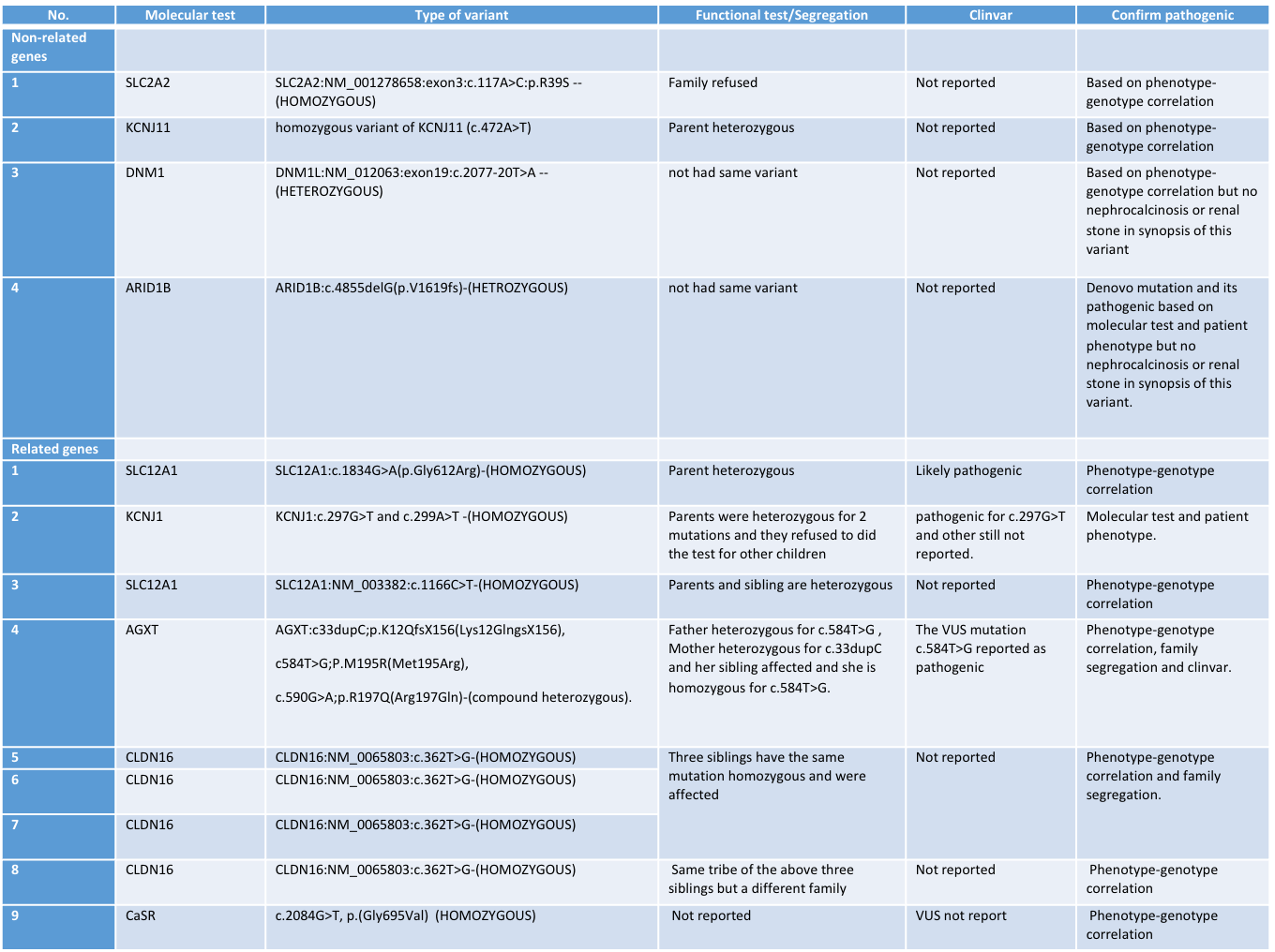Nephrology
Session: Nephrology 3
7 - Genetic causes of nephrocalcinosis/nephrolithiasis in Saudi pediatric population
Sunday, May 5, 2024
3:30 PM - 6:00 PM ET
Poster Number: 7
Publication Number: 7.1721
Publication Number: 7.1721
- Ha
Hadel Sultan alsubaie (she/her/hers)
Pediatric nephrology fellow
King faisal specialized hospital and research center
Riyadh saudi arabia, Ar Riyad, Saudi Arabia
Presenting Author(s)
Background: Nephrolithiasis/nephrocalcinosis are commonly found worldwide with high rates of recurrence. Locally the estimated prevalence of NL/NC 9.1% - 33.1%. Many studies show that the prevalence of NL/NC among children has been increasing over the past 20 years. Genetic tests are leading the clinical practice for identifying inherited conditions. More than 30 causative monogenic mutations have been identified as primarily responsible for NL/NC: DCY10, AGXT, APRT,ATP6V0A4,ATP6V1B1,CA2,CASR,CLCN5,CLCNKB, CLDN16, CLDN19, CYP24A1, FAM20A, GRHPR,HNF4A,HOGA1,HPRT1,KCNJ1,OCRL,SLC12A1,SLC22A12,SLC2A9,SLC34A1,SLC34A3,SLC3A1,SLC4A1,SLC7A9,SLC9A3R1,VDR, and XDH. Despite the increase in number of studies that outlined the prevalence of monogenic mutations and novel disease-causing loci. the contribution of monogenic causes of NL/NC has not been extensively studied in Saudi population.
Objective: to explore the underlying monogenic causes of NL/NC in a Saudi pediatric patient population
Design/Methods: A descriptive retrospective cross-sectional study for patients with NL/ NC radiologically among patients = < 18 years old.A total of 180 pediatric patients enrolled. Date regarding demographic characteristics, genetic diagnosis, biochemical abnormalities, urine chemistry, RRT need were all collected. Inclusion criteria:Patients with primary diagnosis of NL/NC. Exclusion criteria:secondary causes of NL/NC
Results: 30% patients had an identified genetic diagnosis.13.3% found to have a molecular genetic diagnosis directly related to a previously known causative mutation of NL/NC While 17.2% had pathogenic genetic diagnosis that is un-related to the known pool of genes causing NL/NC. Among patients with pathogenic mutation, 25% of the patients developed ESRD And 37.5% of patients received a kidney transplant. Among the genetic mutations identified in our population, 9 were part of the internationally recognized panel and 1 patient was found to have MOCS1 gene mutation which was not included in the 32 gene panel.13 patients had novel genetic variants which are not previously reported:1 patient in each of the following genes AGXT,SLC12A1,CaSR, KCNJ1,SLC2A2,KCNJ11,DNM1,ARID1B and 4 patients in CLDN16. we performed functional analysis through (family segregation, Clinvar website and genotype/phenotype correlation)
Conclusion(s): we evaluated the prevalence of monogenic causes of NL/NC in Saudi paediatric population. We found 13.3% have a genetic cause of their condition and identified 9 novel genetic mutation.MOCS1 and MOCS2 which are well recognized causes of xanthine stones and should be added to the list of monogenic causes of NL/NC

.png)
.png)
